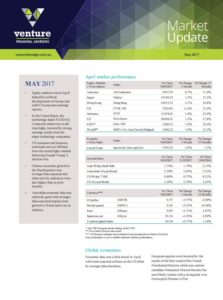The Pulse

- In April, equity markets rose helped by political developments in Europe and solid US corporate earnings reports
- In the United States, the technology-laden NASDAQ Composite Index rose to all time highs, boosted by strong earnings results from the major technology companies
- US consumer and business sentiment surveys fell back from the recent highs reached following Donald Trump’s election win
- Chinese economic growth in the March quarter was stronger than expected and other activity indicators were also higher than in prior months
- Australian economic data was relatively good with stronger than expected employment growth in March and a rise in inflation.
Australia
In Australia, employment increased by 60,900 jobs in March, above expectations of an increase of 20,000 jobs, which took annual employment growth to a six month high of 1.2% year on year. The unemployment rate remained steady at 5.9% in line with market expectations. Australian inflation, which has been very low over the past few years, recovered marginally in the March quarter with the headline CPI 2.1% higher over the year and core annual inflation increased from 1.6% to 1.8%.
Global economies
Economic data was a little mixed in April with some seasonal softness in the US offset by stronger data elsewhere. European equities were boosted by the results of the first round of the French Presidential Election which saw centrist candidate Emmanuel Macron become the most likely winner with a strong lead over Euro-sceptic Marine Le Pen.
US
In the US the advance estimate of first quarter GDP was weaker than expected, rising at an annualised rate of just 0.7% with personal consumption growing at an annualised rate of only 0.3%. Non-farm payrolls were also weaker than expected with just 98,000 new jobs in March, which was the weakest reading since May 2016. The ISM manufacturing index was also weaker than expected in April as consumer and business sentiment declined from their recent post-US election highs.
Europe
In the Eurozone, GDP grew 0.5% over the first quarter, or 1.7% over the past year, marking four straight years of economic growth. In the United Kingdom, GDP growth in the March quarter was a little weaker than expected at 0.3% due to some softness in consumer spending, which has been impacted by the lower British Pound, which has increased prices for British consumers.
China
China’s economic data has been relatively strong in April. GDP increased 6.9% year on year in the March quarter, up from 6.8% in the previous quarter and above expectations of a 6.8% increase.
Asia Region
In Japan, real household spending fell 1.3% year on year in March and core consumer prices have only increased 0.2% over the past year reflecting Japanese consumer caution. The Bank of Japan has kept official interest rates at -0.10% per annum and continues to buy significant volumes of Japanese government bonds each month with the aim of keeping the yield on the ten year government bond at around zero.